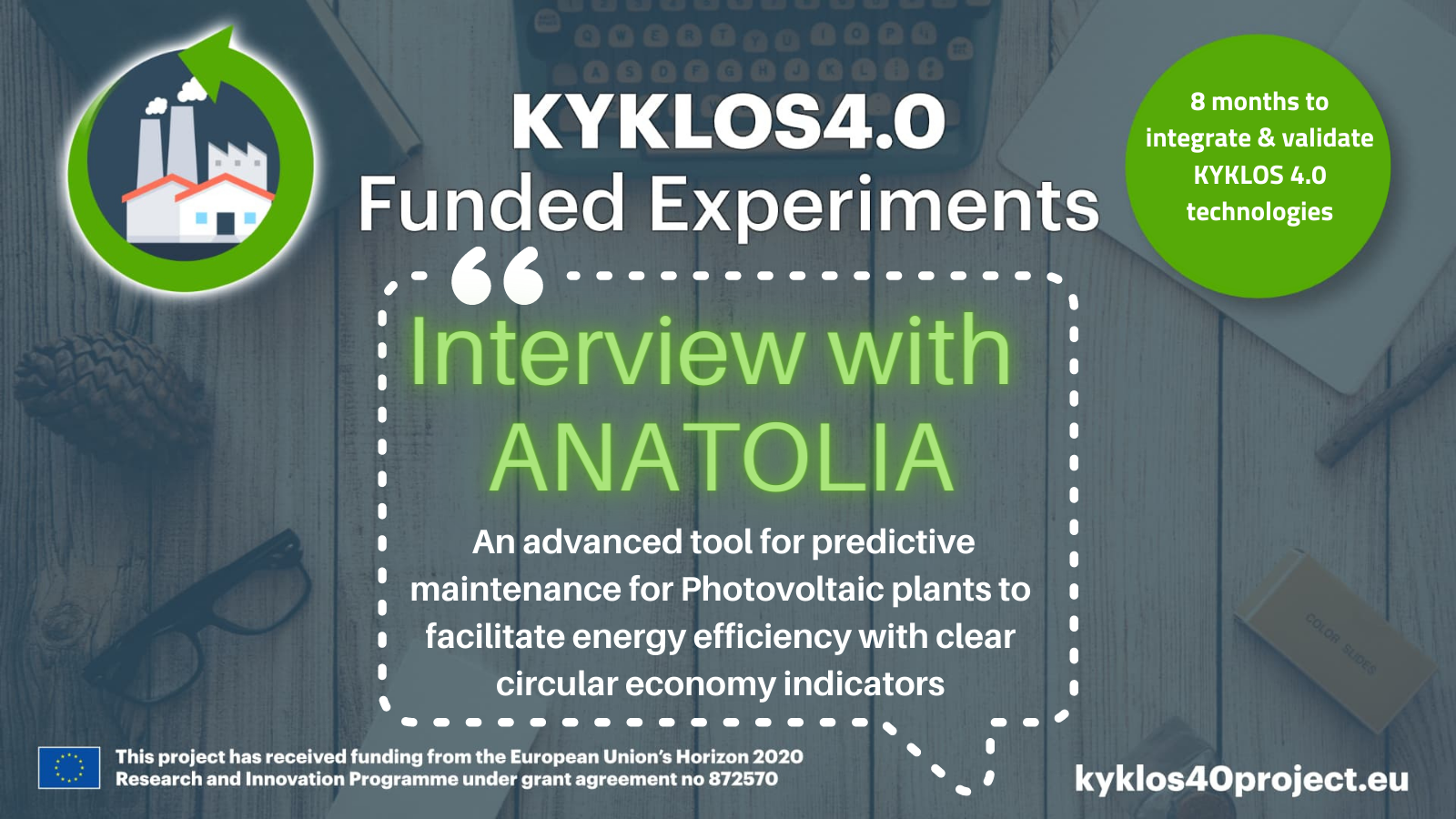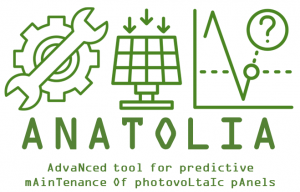
11 May Interview with the ANATOLIA experiment
The KYKLOS4.0 Open Call #2 is funding seventeen experiments that are developing technological solutions of value for the manufacturing domain.
The project will be releasing a series of interviews over the course of the coming weeks with the objective of promoting the work being implemented in these experiments and allowing our readers to understand potential uptake of the solutions being developed by them.
This is the first of the seventeen interviews with the experiments funded under the open call. This first interview is with the ANATOLIA experiment.
* * * * *
Explain your project in one sentence.
The ANATOLIA project aims to deliver a comprehensive tool designed to identify and analyse anomalous behaviour in photovoltaic (PV) operations. This advanced solution will empower PV system operators with actionable insights, enabling them to optimise maintenance scheduling, improve system performance, enhance energy production efficiency, and extend the overall lifespan of their solar installations. The project’s innovative approach will revolutionise the way solar energy systems are monitored and maintained, ultimately contributing to a more sustainable and reliable renewable energy future.
How is KYKLOS4.0 project and the selected services (and components) bringing value to your project?
The ANATOLIA tool, an integral part of the Production Optimisation and Predictive Maintenance service provided by KYKLOS 4.0, aims to revolutionise the renewable energy industry. The Decision Support System (DSS) of KYKLOS 4.0 bolsters the long-term circular analysis of the ANATOLIA tool, facilitating the quantification of circularity within the renewable energy sector. As a data-driven modelling framework, ANATOLIA benefits significantly from the Deep Learning Toolkit offered by KYKLOS 4.0 Cognitive ToolKit (KCTK). The KCTK provides a comprehensive suite of modules and functionalities designed to enable advanced data analytics for the industry, empowering users to make well-informed decisions backed by robust data. These advanced analytics capabilities allow users to optimise energy production, minimise downtime, and reduce operational costs. Furthermore, the tool enhances predictive maintenance capabilities, enabling the early identification and resolution of potential issues in PV plants. This results in increased efficiency and more sustainable operations throughout the entire renewable energy sector. By leveraging the ANATOLIA tool and KYKLOS 4.0 services, stakeholders in the renewable energy industry can drive innovation, support environmental sustainability, and promote the adoption of circular economy principles. This powerful combination ultimately leads to a greener, more efficient, and cost-effective renewable energy landscape.
How is your solution contributing to circular manufacturing?
ANATOLIA introduces an innovative strategy to boost energy efficiency by showcasing a comprehensive predictive maintenance plan for PV plants. This pioneering approach integrates technological innovation, environmental sustainability, energy efficiency, and renewable resource utilisation, creating a virtuous system within a circular economy. We are confident that the ANATOLIA tool, supported by KYKLOS 4.0 services, will enhance the project’s circular nature while striving to develop a fresh perspective that allows for the replacement of costly and occasionally inaccessible in-situ data with satellite-derived information. This methodology not only reduces data collection expenses but also makes it more widely available, benefiting the entire renewable energy sector. By employing cutting-edge satellite data, the ANATOLIA tool empowers plant operators to proactively address potential issues, minimising downtime and optimising energy production. As a result, the renewable energy sector will experience significant cost savings and increased efficiency. Moreover, the environmental advantages of ANATOLIA’s unique approach are substantial. By advocating for the circular nature of the project and the use of renewable resources, the tool helps reduce greenhouse gas emissions and combat climate change.
How will your solution be replicated and used in other manufacturing environments?
The ANATOLIA tool, in conjunction with KYKLOS 4.0 services, can be effectively replicated and employed across various manufacturing environments by embracing a number of key strategies. Firstly, the tool is designed to be adaptable and customisable to accommodate different manufacturing processes and industries, allowing it to address their specific operational and maintenance needs. Secondly, seamless integration with existing Enterprise Resource Planning (ERP), Manufacturing Execution Systems (MES), and Industrial Internet of Things (IIoT) platforms enables the efficient exchange of data and insights, helping manufacturers optimise processes and maintenance schedules. Moreover, comprehensive training programs and ongoing support will be provided to users, ensuring they understand the tool’s functionalities and benefits. This support structure guarantees effective implementation across diverse manufacturing environments. A culture of collaboration and knowledge sharing among stakeholders in the manufacturing sector promotes the sharing of best practices and success stories, enabling other manufacturers to learn and replicate the ANATOLIA tool effectively. Lastly, the tool’s scalability allows it to cater to various facility sizes and production capacities, ensuring it can be employed effectively in different manufacturing settings, irrespective of their size or complexity. By leveraging these strategies, the ANATOLIA tool and KYKLOS 4.0 services can drive innovation and promote sustainable solutions.
What advice would you give to companies wishing to make their manufacturing processes more circular?
Companies aiming to make their manufacturing processes more circular should adopt a multifaceted approach to ensure sustainability and resource efficiency. Firstly, organisations should perform a thorough analysis of their current processes to identify inefficiencies and areas that can benefit from circularity. This analysis should be followed by setting clear goals and developing a strategic plan to achieve them. Integrating circular principles such as reducing waste, maximising resource efficiency, and utilising renewable energy sources is essential to create a more sustainable manufacturing environment. Embracing innovative technologies like AI, IoT, and advanced data analytics can help companies optimise their processes and enhance predictive maintenance capabilities. Implementing circular design principles and exploring opportunities for upcycling, remanufacturing, and product-as-a-service models can further strengthen the circularity of manufacturing processes. Collaboration and knowledge sharing across the supply chain, as well as with external stakeholders, play a crucial role in fostering circularity. Finally, cultivating a culture of continuous improvement and sustainability within the organisation ensures that employees are actively engaged in driving circularity initiatives. Adopting the strategies mentioned, companies can achieve a more sustainable and resource-efficient manufacturing environment.

* * * * *
About the ANATOLIA project
The ANATOLIA project – AdvaNced tool for predictive mAinTenance Of photovoLtaIc pAnels management – is implemented by three partners: NEURALIO AI P.C. (Greece), Solarkapital Asset Management Services LP (Greece), IA AGRO P.C. (Greece).
Summary: The main objective of the project is to facilitate energy efficiency with clear circular economy indicators by introducing an advanced tool for predictive maintenance of Photovoltaic plants.

